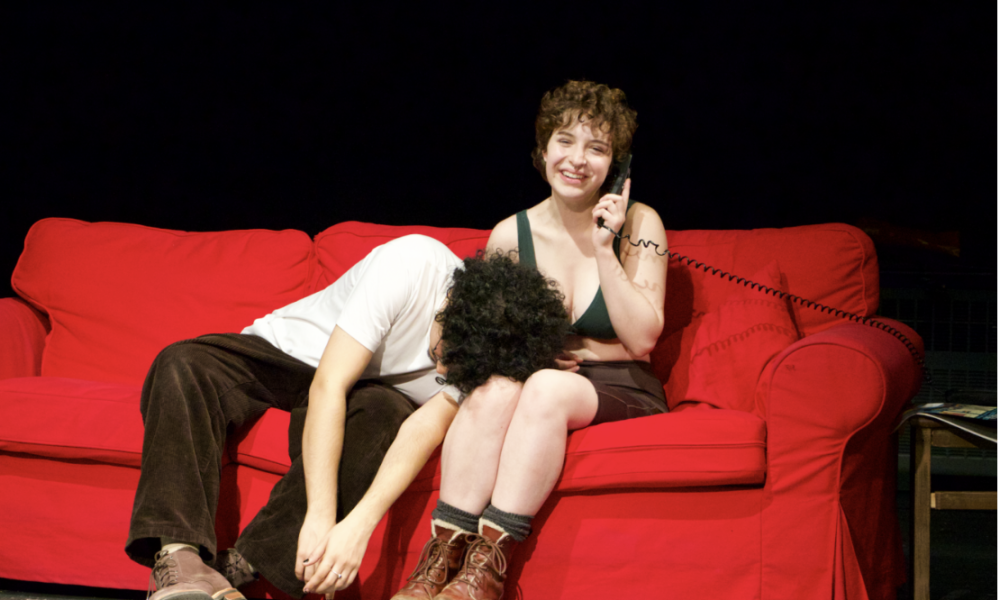Before I saw “The Road to Hell,” nobody would tell me anything about it. The play is modern and relatively unknown, so a cursory Google Search reveals very little. I learned that it consists of two one-act plays, with two actors in each act. A new, mysterious play with a tight cast—I was intrigued.
McGill’s Players’ Theatre is small and intimate, the perfect setting to focus on the inner workings of four characters. I arrive early to interview director Henry Kemeny-Wodlinger (U1 Arts), who is happy to discuss anything about the play but the plot. Kemeny-Wodlinger is a serious, hands-on director—he just directed “KIN” at the Toronto Fringe Festival in 2022. Despite his obvious talent and experience in theatre, he credits the other members of the production with “keeping the show grounded.” Megan Siow, the stage manager, gave critical second opinions and “kept track of the practical side of things;” costume designer Olivia Reeve (U3 Arts) brought out new elements of the characters. Plus, each act consists of vignettes, strung together by vocal performances from a very talented trio: Mia Gallant-Campagne (U2 Arts), Hannah Marder-MacPherson (U2 Science), and Irene Newman Jimenez (U3 Arts & Science). Kemeny-Wodlinger tells me that casting was critical—actors had to grasp authentically the inner workings of their very quirky characters.
The first act, “Yodellers,” follows a golf reporter, Lorne (Hayden Jackson, U3 Arts), who interviews a rising golf star named Meg Boot (Tori Rotolo, U3 Arts). They end up spending a night together sharing stories. The next day, Meg wins the US Open. Lorne rushes to her hotel room and proclaims his love for her. She returns the sentiment. The problem? Meg is a lesbian. Despite their obvious incompatibility, Meg is soothed by Lorne’s presence, and Lorne is awestruck by her athletic talent. They remain together during Meg’s tour but are unable to name or understand their relationship.
The actors play this impasse very well. Rotolo’s Meg is impossible, dramatic, and obsessed with her own burgeoning success. Jackson’s Lorne is tortured, desperate for Meg’s impossible affection—a dog kicked by her sexuality. He makes several attempts to win her over, which leads to moments of profound earnestness: At one point, Meg sits on Lorne’s lap while they tell sex stories. In the process, however, he quickly realizes that “the wrong parts of this are turning [her] on.” While the situation is impossible, neither character wants to exit this hell of their own devising.
The second act, “Kreskinned,” focuses on a couple who are hypnotized on their first date. The opening scene finds them transformed: Joyce (Naomi Decker, U3 Arts) runs around like a chicken, while Dennis (Mazdak Darvishi, U2 Arts) becomes a car. Once the hypnotism wears off, they discover that their trigger words still work, causing the other partner to sink into a trance and forget whatever has just happened. They begin to abuse this power over one another, avoiding the awkward moments of a new relationship. A conversation about Joyce’s fight with her sister, Dennis’s forgotten birthday gift, and a too-brief sexual encounter are all erased. While smoothing over the screw-ups, the two fall in love, suspended in this untenable perfection.
The act is deeply hilarious—both characters are so silly and earnest, with palpable chemistry. Joyce is fastidious and insecure until she is “transformed by her chicken.” Dennis is shy and vulnerable, soft-hearted and prone to jumping into things. In my favourite scene, Joyce struggles to be a good host but the food portions are meagre, the wine glass singular, and the chip dip goes everywhere. The scene’s physical comedy is as touching as it is awkward.
Kemeny-Wodlinger’s coy comments are now better contextualized. Throughout the play, all characters are very impulsive. The director clearly encouraged the actors to lean into it and work on instinct, letting each couple’s fascinating dynamic shine. While the situations are farcical, “The Road to Hell” brings to life the real impasses and self-imposed hell of relationships with sensitivity and humour.









